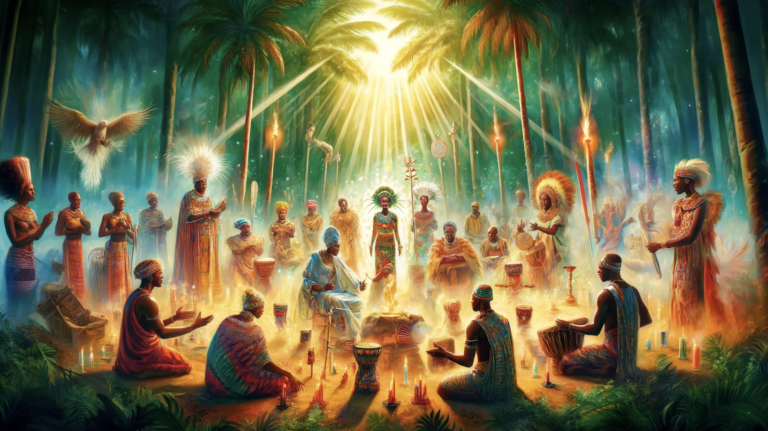Hey Tribe,
In recent years, there’s been a powerful resurgence of African Traditional Religions (ATRs) and spiritual practices within the Black and African diaspora. It’s a beautiful wave, a return to our roots, and a reconnection with the rich, vibrant tapestry of our ancestral heritage. This revival is more than just a trend; it’s a profound journey of self-discovery, healing, and empowerment. Let’s dive into why tapping into our ancestral gifts is so crucial for us as a people.
Join the 8 Week Transformative Program that dives deeper into out ancestral spiritual gifts to create an abundant life.
A Historical Snapshot: Our Spiritual Heritage
Before the transatlantic slave trade and colonialism disrupted our cultures, our ancestors practiced diverse and deeply rooted spiritual traditions. From the Yoruba religion in Nigeria, Vodun in Benin and Togo, to the spiritual practices of the Akan in Ghana, these religions were integral to daily life. They offered guidance, fostered community, and maintained a harmonious relationship with nature.
Colonial powers, however, labeled these practices as “pagan” or “primitive,” forcing our ancestors to abandon their spiritual heritage in favor of Christianity and Islam. Despite this, many traditions survived, hidden in plain sight, blended with new beliefs, and passed down through generations.
The Power of Ancestral Gifts
Tapping into our ancestral gifts isn’t just about spirituality; it’s about reclaiming our identity, culture, and power. Here’s why it’s so important:
- Reclaiming Our Roots: Understanding and practicing ATRs allows us to reclaim a part of our history that was systematically erased. It’s an act of resistance against centuries of cultural erasure and a step towards healing historical wounds.
- Community and Connection: ATRs are inherently communal. They emphasize the importance of community, kinship, and interconnectedness. In a world where we often feel isolated, these practices remind us that we are never alone; we are part of a larger, supportive network.
- Personal Empowerment: Engaging with our ancestral practices empowers us to take control of our spiritual journeys. It offers a sense of belonging and purpose, grounding us in traditions that have stood the test of time.
- Healing and Balance: Many ATRs focus on harmony with nature and the spiritual world. Practices like divination, herbal medicine, and rituals help us restore balance, promote healing, and enhance our well-being.
- Cultural Pride: Embracing ATRs instills a sense of pride in our heritage. It reminds us of the wisdom and resilience of our ancestors, fostering a deeper appreciation for our culture and traditions.
How to Start Your Journey
- Research and Learn: Start by reading books, watching documentaries, and engaging with practitioners who are knowledgeable about ATRs. Learn about the different traditions and find one that resonates with you.
- Connect with the Community: Join online forums, attend local gatherings, or participate in workshops. Building connections with others on this journey can provide support and deepen your understanding.
- Incorporate Practices: Begin incorporating small rituals into your daily life. This could be as simple as creating an ancestor altar, practicing meditation, or learning about the herbs and plants used in traditional healing.
- Seek Guidance: If possible, find a mentor or elder who can guide you. Their experience and wisdom can be invaluable as you navigate this path.
- Stay Open and Respectful: Approach these practices with an open heart and mind. Respect the traditions, and remember that this journey is deeply personal and unique to each individual.
Conclusion: A Call to Reconnect
The resurgence of African Traditional Religions and spiritual practices is more than just a movement; it’s a call to reconnect with our roots, honor our ancestors, and reclaim our spiritual heritage. By tapping into our ancestral gifts, we not only enrich our lives but also contribute to the preservation and celebration of our rich cultural legacy.
With love and light,
Mocha Moizelle


